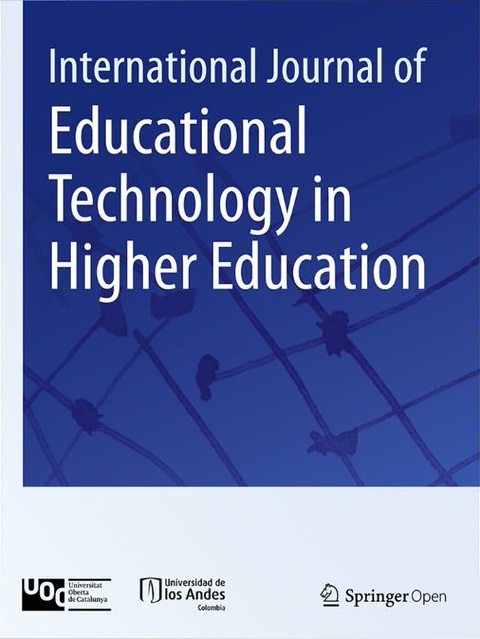认识论信念与技术、教学和内容知识(TPACK)的关系
IF 16.7
1区 教育学
Q1 EDUCATION & EDUCATIONAL RESEARCH
International Journal of Educational Technology in Higher Education
Pub Date : 2023-05-07
DOI:10.46328/ijte.425
引用次数: 0
摘要
21世纪不断变化的发展也影响了技术和教师的认识论信仰。为此,本研究考察了小学教师和社会学科教师的认识论信念与技术、教学和内容知识(TPACK)水平、性别、年龄、专业年资、教育程度、分支变量以及认识论信念与TPACK的关系。本研究的研究小组由在公立小学工作的小学教师和在伊斯坦布尔、安塔利亚和伊斯帕塔省和地区的公立中学工作的社会研究教师组成。选择合适的抽样方法进行研究,这是一种非偶然抽样方法。178名小学教师和48名社会学科教师参与了本研究。数据分析采用独立样本t检验、Kruskal-Wallis检验和Pearson相关分析。从研究结果来看,小学教师和社会学科教师对努力子维度的信念水平都较高。结果发现,小学教师和社会学科教师的TPACK水平均较高。在认识论信念量表上,小学教师的年龄、受教育程度和职业年资没有显著差异。社会学科教师在性别变量上无显著差异。从TPACK量表及其子维度的结果来看,小学教师和社会学科教师在性别和专业年资方面存在显著差异。小学教师努力得分与TK、CT、TPK、TCK、TPACK总分呈低水平正相关。本文章由计算机程序翻译,如有差异,请以英文原文为准。
The Relationship between Epistemological Beliefs and Technological, Pedagogical, and Content Knowledge (TPACK)
Changing developments in the 21st century have also affected technology and the epistemological beliefs of teachers. For this purpose, the epistemological beliefs and Technological, Pedagogical, and Content Knowledge (TPACK) levels of primary school teachers and social studies teachers, gender, age, professional seniority, educational status, branch variables, and the relationship between epistemological belief and TPACK were examined in this study. The study group of the research consists of primary school teachers working in public primary school and social studies teachers working in public secondary schools in the provinces and districts of Istanbul, Antalya and Isparta. The selection of the study was made with the appropriate sampling method, which is one of the non-accidental sampling methods. 178 primary school teachers and 48 social studies teachers participated in the research. Independent sample t-test, Kruskal-Wallis test and Pearson Correlation Analysis were used in data analysis. According to the results obtained from the research, both primary school and social studies teachers have a high level of belief in the sub-dimension of effort. It was observed that both primary school teachers and social studies teachers had high TPACK levels. Considering the epistemological belief scale, no significant difference was observed according to the age, education level and professional seniority of the primary school teachers. There was no significant difference in social studies teachers according to the gender variable. According to the results obtained from the TPACK scale and its sub-dimensions, a significant difference was observed in terms of gender and professional seniority of primary school and social studies teachers. A low level of positive correlation was found between the effort scores of the primary school teachers and TK, CT, TPK, TCK and TPACK total scores.
求助全文
通过发布文献求助,成功后即可免费获取论文全文。
去求助
来源期刊
CiteScore
19.30
自引率
4.70%
发文量
59
审稿时长
76.7 days
期刊介绍:
This journal seeks to foster the sharing of critical scholarly works and information exchange across diverse cultural perspectives in the fields of technology-enhanced and digital learning in higher education. It aims to advance scientific knowledge on the human and personal aspects of technology use in higher education, while keeping readers informed about the latest developments in applying digital technologies to learning, training, research, and management.

 求助内容:
求助内容: 应助结果提醒方式:
应助结果提醒方式:


